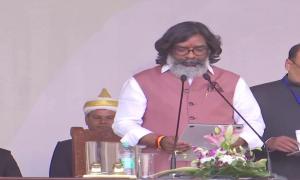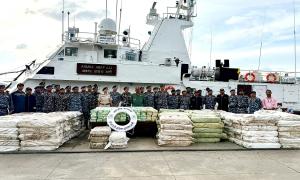Shifting its strategy, the United States has drafted a proposal to build an armed tribal paramilitary force in Pakistan's frontier areas by enlisting local leaders to counter the expanding base of Al Qaeda and the Taliban in the region.
If adopted, the proposal is likely to expand the presence of the US military trainers in Pakistan, directly finance a separate tribal paramilitary force, that until now has proved largely ineffective, and pay militias, who agreed to fight Al Qaeda and foreign extremists, the New York Times said, quoting officials.
Altogether, the broader strategic move toward more local support is being accelerated because of concern about instability in Pakistan and the weakness of the Pakistan government, as well as fears that extremists with havens in the tribal areas could escalate their attacks on allied troops in Afghanistan, the report said.
The US currently has only about 50 troops in Pakistan, a Pentagon spokesman was quoted but this force could grow by dozens under the new strategy, prepared by staff members of the United States Special Operations Command.
The proposal is in part modeled on a similar effort by American forces in Anbar Province in Iraq that has been hailed as a great success in fighting foreign insurgents there, the paper said.
It also raises question of whether such partnerships can be forged without a significant American military presence in Pakistan. And it is unclear whether enough support can be found among the tribes.
Just in recent weeks, Islamic militants sympathetic to Al Qaeda and the Taliban have already extended their reach beyond the frontier areas into more settled areas, most notably the mountainous region of Swat.
The tribal proposal has been circulated to counter terrorism experts but has not yet been formally approved by the command's headquarters, the Times said.
Some other elements of the campaign, the paper said, have been approved in principle by the America and Pakistan, and await financing. An aid of $350 million over several years to help train and equip the Frontier Corps, a paramilitary force that now has about 85,000 members and is recruited from border tribes, is being approved.
Ever since September 11, 2001, the Bush administration has used billions of dollars of aid and heavy political pressure to encourage General Pervez Musharraf to carry out more aggressive military operations against militants in the tribal areas. But the sporadic military campaigns Pakistan has conducted there have had little success, resulting instead in heavy losses among Pakistani Army units and anger among local residents.
American officials, the Times says, acknowledge those failures, but say that the renewed emphasis on recruiting allies among the tribal militias and investing more heavily in the Frontier Corps reflect the depth of American concern about the need to address Islamic extremism in Pakistan.
According to the report, the new counter insurgency campaign is also an example of the American military's asserting a bigger role in a part of Pakistan that the Central Intelligence Agency has overseen almost exclusively since September 11, the report said.
Small numbers of United States military personnel have served as advisers to the Pakistani Army in the tribal areas, giving planning advice and helping to integrate American intelligence, said one senior American officer with long service in the region.








More from rediff